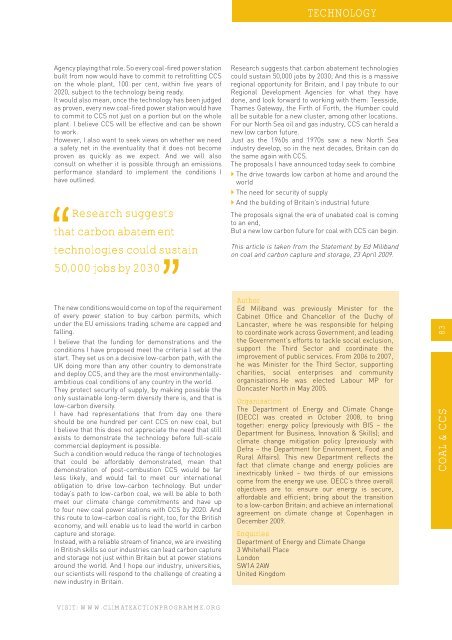Climate Action 2009-2010
You also want an ePaper? Increase the reach of your titles
YUMPU automatically turns print PDFs into web optimized ePapers that Google loves.
TECHNOLOGY<br />
Agency playing that role. So every coal-fired power station<br />
built from now would have to commit to retrofitting CCS<br />
on the whole plant, 100 per cent, within five years of<br />
2020, subject to the technology being ready.<br />
It would also mean, once the technology has been judged<br />
as proven, every new coal-fired power station would have<br />
to commit to CCS not just on a portion but on the whole<br />
plant. I believe CCS will be effective and can be shown<br />
to work.<br />
However, I also want to seek views on whether we need<br />
a safety net in the eventuality that it does not become<br />
proven as quickly as we expect. And we will also<br />
consult on whether it is possible through an emissions<br />
performance standard to implement the conditions I<br />
have outlined.<br />
“<br />
Research suggests<br />
that carbon abatement<br />
technologies could sustain<br />
50,000 jobs by 2030<br />
“<br />
Research suggests that carbon abatement technologies<br />
could sustain 50,000 jobs by 2030; And this is a massive<br />
regional opportunity for Britain, and I pay tribute to our<br />
Regional Development Agencies for what they have<br />
done, and look forward to working with them: Teesside,<br />
Thames Gateway, the Firth of Forth, the Humber could<br />
all be suitable for a new cluster, among other locations.<br />
For our North Sea oil and gas industry, CCS can herald a<br />
new low carbon future.<br />
Just as the 1960s and 1970s saw a new North Sea<br />
industry develop, so in the next decades, Britain can do<br />
the same again with CCS.<br />
The proposals I have announced today seek to combine<br />
} The drive towards low carbon at home and around the<br />
world<br />
} The need for security of supply<br />
} And the building of Britain’s industrial future<br />
The proposals signal the era of unabated coal is coming<br />
to an end,<br />
But a new low carbon future for coal with CCS can begin.<br />
This article is taken from the Statement by Ed Miliband<br />
on coal and carbon capture and storage, 23 April <strong>2009</strong>.<br />
The new conditions would come on top of the requirement<br />
of every power station to buy carbon permits, which<br />
under the EU emissions trading scheme are capped and<br />
falling.<br />
I believe that the funding for demonstrations and the<br />
conditions I have proposed meet the criteria I set at the<br />
start. They set us on a decisive low-carbon path, with the<br />
UK doing more than any other country to demonstrate<br />
and deploy CCS, and they are the most environmentallyambitious<br />
coal conditions of any country in the world.<br />
They protect security of supply, by making possible the<br />
only sustainable long-term diversity there is, and that is<br />
low-carbon diversity.<br />
I have had representations that from day one there<br />
should be one hundred per cent CCS on new coal, but<br />
I believe that this does not appreciate the need that still<br />
exists to demonstrate the technology before full-scale<br />
commercial deployment is possible.<br />
Such a condition would reduce the range of technologies<br />
that could be affordably demonstrated, mean that<br />
demonstration of post-combustion CCS would be far<br />
less likely, and would fail to meet our international<br />
obligation to drive low-carbon technology. But under<br />
today’s path to low-carbon coal, we will be able to both<br />
meet our climate change commitments and have up<br />
to four new coal power stations with CCS by 2020. And<br />
this route to low-carbon coal is right, too, for the British<br />
economy, and will enable us to lead the world in carbon<br />
capture and storage.<br />
Instead, with a reliable stream of finance, we are investing<br />
in British skills so our industries can lead carbon capture<br />
and storage not just within Britain but at power stations<br />
around the world. And I hope our industry, universities,<br />
our scientists will respond to the challenge of creating a<br />
new industry in Britain.<br />
Author<br />
Ed Miliband was previously Minister for the<br />
Cabinet Office and Chancellor of the Duchy of<br />
Lancaster, where he was responsible for helping<br />
to coordinate work across Government, and leading<br />
the Government’s efforts to tackle social exclusion,<br />
support the Third Sector and coordinate the<br />
improvement of public services. From 2006 to 2007,<br />
he was Minister for the Third Sector, supporting<br />
charities, social enterprises and community<br />
organisations.He was elected Labour MP for<br />
Doncaster North in May 2005.<br />
Organisation<br />
The Department of Energy and <strong>Climate</strong> Change<br />
(DECC) was created in October 2008, to bring<br />
together: energy policy (previously with BIS – the<br />
Department for Business, Innovation & Skills); and<br />
climate change mitigation policy (previously with<br />
Defra – the Department for Environment, Food and<br />
Rural Affairs). This new Department reflects the<br />
fact that climate change and energy policies are<br />
inextricably linked – two thirds of our emissions<br />
come from the energy we use. DECC’s three overall<br />
objectives are to: ensure our energy is secure,<br />
affordable and efficient; bring about the transition<br />
to a low-carbon Britain; and achieve an international<br />
agreement on climate change at Copenhagen in<br />
December <strong>2009</strong>.<br />
Enquiries<br />
Department of Energy and <strong>Climate</strong> Change<br />
3 Whitehall Place<br />
London<br />
SW1A 2AW<br />
United Kingdom<br />
COAL & CCS 83<br />
VIS I T: WWW.CLIMATEACTIONPROGRAMME.ORG












